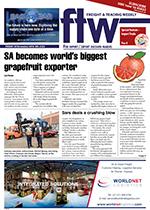It’s all systems go for the second phase of Reporting of Conveyances and Goods (RCG) which will be implemented next month. According to Beyers Theron, SA Revenue Service (Sars) acting chief officer Customs & Excise, the scheduled date for phase 2, involving partshipment movements of goods across land borders, is December 7. “This will mainly impact road carriers, clearing agents and service providers/ bureaus,” he said. “Sars will be introducing a system change which will allow multiple trucks carrying the same consignment (LRN) to be electronically marked for arrival and exit at border posts.” Road carriers, said Theron, would need to indicate on their electronic road manifest that the cargo they were carrying was a part-shipment movement. They would also need to indicate on the last manifest that it was the final truck carrying the partshipment. Theron said since implementing RCG in April understanding of and compliance with the mandatory electronic submission of reports had significantly improved. With the introduction of the penalty system in November, which could see non-compliant cargo reporters fined up to R5000, Theron said Sars was continuing to support those who still needed to conclude technical development or testing. “We are also continuously updating the RCG webpage with the latest Frequently Asked Questions (FAQs), correspondence and presentations shared at various stakeholder engagements to keep affected people fully informed,” he said. Whilst the initial uptake of reporting had been extremely slow, Theron said a significant increase was evident in some areas, particularly in the number of cargo reports submitted by freight forwarders reporting their house bills of lading or house air waybills to Sars. “Comparing the figures for the month following the implementation (May) to what was submitted during October 2018, we see a reporting increase of 70% for freight forwarders in the air industry and a 47% increase for those active in the sea modality,” he told FTW. “Unfortunately, the reporting from facility-based reporters (wharf operators, container depot licensees, transit shed operators, de-grouping depot licensees, etc.) remains below par and needs to be addressed.” Theron said staff in Durban and at OR Tambo International Airport (Ortia) had been trained in the use of the RCG system functionality which made visible those who were not currently submitting electronic reports. “With the expiry of the November 1 deadline, the project-driven and industrywide approach relating to reporting compliance has come to an end and, as a result, Customs officers at branches have been tasked with directly engaging people not reporting electronically. The Durban office will be responsible for driving compliance in the sea modality and Ortia for the air modality,” he said. “Generally speaking, affected people understand the need for electronic conveyance and cargo reporting and are either already complying or want to comply. Where reporters are currently experiencing short-term challenges, Sars will engage with them and agree on individual compliance plans prior to reverting to the imposition of penalties.” According to Theron the roadshows and the RCG-specific stakeholder engagements have already gone a long way to assist and educate stakeholders. “It has also been made clear to industry that the implementation of RCG was brought forward and that the implementation of the first phase of Registration, Licensing and Accreditation (RLA) will follow towards the end of the first half of 2019.” Commenting on any particular challenges experienced with RCG, Theron said reporters in some instances were trying to pre-empt matters by attempting to apply for up-front exemptions prior to any engagement with Sars on the circumstances surrounding or affecting their individual reporting compliance.
INSERT with CAPTION
Where reporters are currently experiencing shortterm challenges, Sars will engage with them prior to imposing penalties. – Beyers Theron

